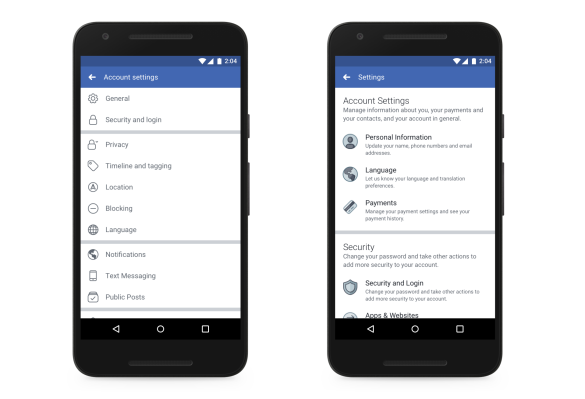With Facebook facing a wave of public backlash over how it has handled user data over the years — a backlash that was kicked off two weeks ago with the revelation that data analytics firm Cambridge Analytica had worked on targeted election campaigns using personal and private Facebook data — the company today announced a new set of changes to help users find and change their privacy settings, as well as download and delete whatever data has been collected through Facebook’s network of social media services.
To be clear, many of these settings and features already existed in Facebook, but now Facebook is making them significantly clearer for the average user to find and use. It’s possible that Facebook would have had to do a lot of this work anyway in light of the new GDPR requirements that are coming into place in Europe.
What today’s changes do not do is provide any indications that Facebook plans to do anything different in terms of what information it’s gathering and using to run its service, and its bigger, profitable business. (Indeed, even upcoming changes to its terms of service, which will include more clarity on Facebook’s data policy, will contain no changes in it, the company says: “These updates are about transparency – not about gaining new rights to collect, use, or share data,” writes Erin Egan, Facebook’s chief privacy officer.)
We’ve seen a lot of people already downloading their Facebook data in the last week or so (without today’s update), and the impression you get is that they are generally coming away shocked by the amount of information that had been amassed through Facebook’s various apps across web and mobile. That in itself — combined with more scrutiny from regulators over how data is collected, used, and shared, and bigger changes that Facebook is making in terms of how it works with third-party apps that link into the Facebook platform (which CEO Mark Zuckberg announced last week) — will hopefully lead to more meaningful changes on that front.
For the time being, however, the main idea here is that if you choose to stay and use Facebook, caveat emptor, and proceed armed with more control. Facebook highlights several areas where changes are being put in place:
User controls. Facebook said that it has redesigned its settings menu for mobile, consolidating all of the primary controls on one screen. This is already a major change, given that previously they were spread across 20: a gating factor that would have meant it was hard to find what you were trying to change, or perhaps leading many to give up altogether. It’s also making it clear what can and cannot be shared with apps, specifically: “We’ve also cleaned up outdated settings so it’s clear what information can and can’t be shared with apps,” writes Egan. The fact that it seems there were some out of date elements in the menus highlights that this might not have been Facebook’s biggest priority up to now.
Privacy shortcuts. For those who don’t want to dive into their settings, Facebook said it is also going to put in a new item into its menu, directly linking users to privacy settings. Privacy Shortcuts, Facebook said, will come by way of a few taps and will let people add in two-factor authentication; composite access to what you’ve shared via Facebook with the option of deleting if you choose; controls for your ad settings, which will also include an explanation of how ads work on Facebook for those who might want to know more; and a link to help you control what and how you share on the site — that is, the setting of “public, friends only, and friends of friends.” Again, that control has been in place for years already at Facebook, but many don’t know how to access it, or what it means. Putting it a little more front and center might change that.
Downloading and deleting Facebook data. The aim here is to make it easier for people to do both if they want. Access Your Information will be a secure link that people can use to collect this, and it will make it easier for people to do both. Will the ease and openness make it less likely that users will decide to leave Facebook altogether? That remains to be seen.
The news comes in the wake of CEO Mark Zuckerberg last week posting an acknowledgement of Facebook’s role in the scandal, and a pledge to improve the company’s practices with regards to third-party apps and how Facebook works with them, and what data it will provide in the future, which he also followed up with a full-page apology printed in several newspapers. It has not been enough for some, and #deletefacebook has become a trending concept, with the company’s stock taking a nosedive in the last two weeks.
